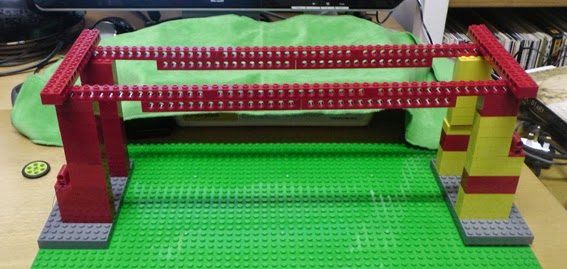PRIMARY SCIENCE : BRIDGES
The North East of England is known for its bridges crossing the Tyne, Wear & Tees. This is especially helpful when teaching about the forces involved in supporting bridges where I usually show a slide show of them.
 |
| Transporter Bridge across the River Tees |
 |
| The Swing Bridge across the River Tyne |
I then go on to ask "Who can build me the strongest bridge from just one sheet of A4 card /paper?". This is fun and good to video but, for me, a bit repetitive.
 |
| One of the best ever A4 card bridges - not mine. |
I try for added "wow" by showing the Tacoma Bridge Disaster movie or the Top Gear look at the Millau Suspension Bridge.
What is now of particular interest to me are bridges that move and there are four in the region:-
on the River Tees Transporter Bridge
Newport Bridge (no longer moving)
on the River Tyne Swing Bridge
Millennium Bridge
Having got into Lego models through WeDo, having Scratch in my arsenal and having collected some K'nex, I've been trying out making interactive, moving models of these bridges.
Here's the approach:-
Here's the approach:-
(a) build a working model of one of the bridges incorporating sensors and
motors
motors
(b) use Scratch rather than the WeDo coding to control the bridge
(c) make the Scratch program interact with your 3D model i.e. what happens in
real life also happens on screen.
real life also happens on screen.
This can prove tricky especially when it comes to weight and accurate control of the motor.
Modelling the Swing Bridge has given me the most pleasure so far, the Transporter Bridge the most headaches.
Modelling the Swing Bridge has given me the most pleasure so far, the Transporter Bridge the most headaches.
 |
| The superstructure for my transporter bridge |
Here's a screenshot of my Scratch program.
 |
| My Scratch version of the Transporter Bridge |
More to follow, especially if I can get some children involved.
No comments:
Post a Comment